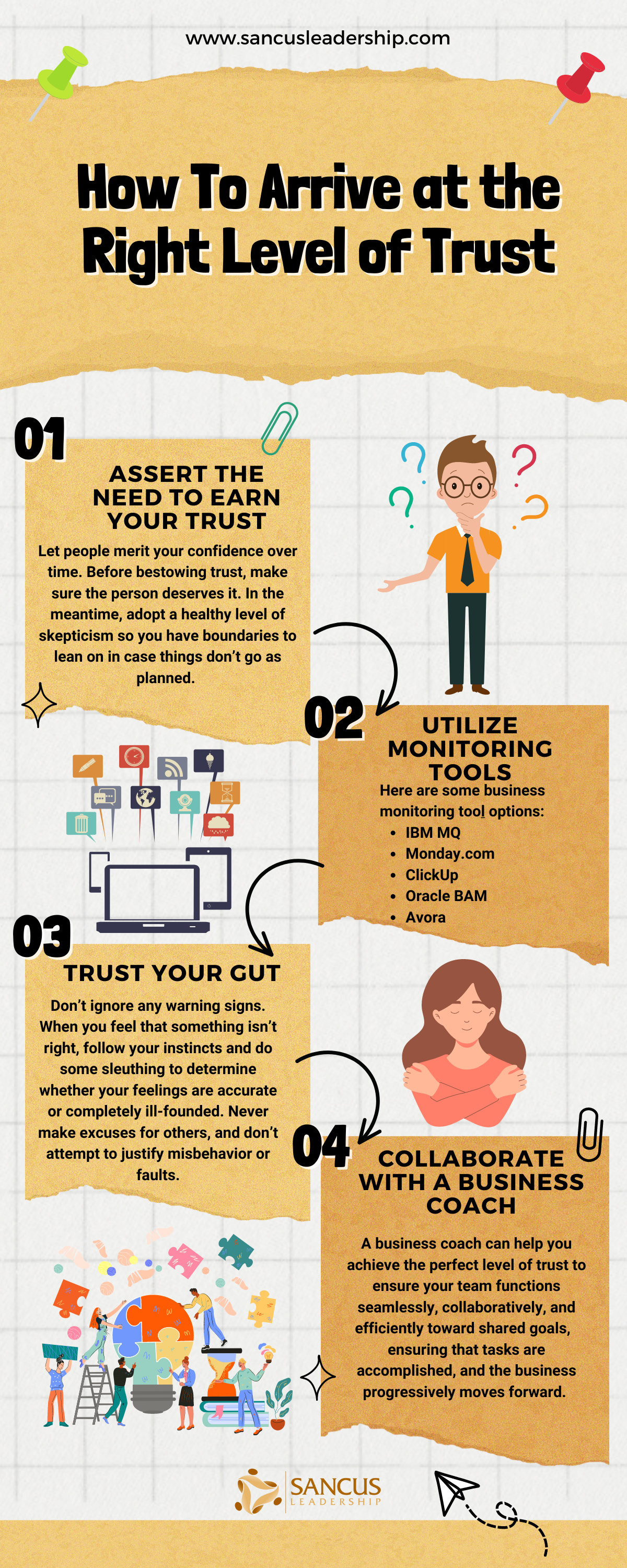Gone are the days when leadership connotes authoritarianism — where team members are expected to fully submit to the authority of their leader, no questions asked. These days, trust has become such a crucial aspect of leadership that many leaders inadvertently afford their team members too much freedom and autonomy. When a leader is to trusting, the danger is that they may be labeled vulnerable, impressionable, and easy to fool.
Being too trusting is a weakness of leaders since it can leave you vulnerable to manipulation and exploitation. It can also make some employees from both ends of the pole feel isolated, with some feeling obliged to overwork while others feel unseen. It can also make you lose control of your team.
Find out more about why you should moderate trust and the possible repercussions if you don’t. We will also talk about some possible reasons why you trust others so quickly and what you can do to ensure that you utilize the right level of trust in effectively managing your team. Let’s start!
What Can Happen When a Leader Is Too Trusting?

If you don’t trust your team enough, you’ll be labeled a cynical and controlling leader, prone to spying on your team, accusing them of suspicious behavior, or doubting their skills and intentions. That’s why great leaders emphasize the value of trust since this gives the team a sense of safety in taking risks and working harmoniously with each other.
It is common knowledge that trust offers many benefits, and that’s why many leaders prioritize forging trust within their teams. They allow their employees the freedom to make decisions and choose which strategy to employ and which tasks to undertake, all to promote a strong level of trust within the group.
When there is trust, you can look forward to the following:
- Open, honest communications
- Culture of transparency
- Fewer conflicts
- Excellent teamwork
- Improved innovation and creativity
- High engagement
- High job satisfaction
- Enhanced productivity
- High employee retention rate
Leaders who bank on trust hope this will give rise to driven, independent employees with a strong sense of ownership.
Repercussions of Absolute Trust Within the Team
However, being too trusting is also a flaw in leadership. Your generosity might be misconstrued as a weakness, and some team members might exploit your vulnerability.
Here’s what can happen when a leader is too trusting:
1. You Become Vulnerable to Manipulation
Please don’t assume that all your team members are worthy of the trust you bestow. You will undoubtedly encounter unscrupulous individuals who will take advantage of your trust to manipulate and exploit you.
Please don’t assume that all your team members are worthy of the trust you bestow.
These individuals will attempt to swing scenarios to their favor so they always appear more efficient, professional, and productive than they are. They might also try to exploit you by maneuvering situations so they take credit for work they have yet to carry out.
2. You Lose Control of Your Team
Some leaders who promote trust show it by minimizing proper supervision of their employees. Remember, self-monitoring isn’t always reliable, and you cannot expect each team member to readily and effectively coordinate and collaborate with everyone else.
3. It May Lead to Exclusion
I firmly believe everyone is allowed to have favorites, but we mustn’t make this too apparent as a leader. When a leader has undisguised choices in the team, the favored, a trusted employee might feel obliged to repay your kindness by taking on more work than they’re comfortable with, never complaining about anything, and always agreeing to whatever you say. This may lead to employee burnout, poor job satisfaction, and high employee turnover.
Overt favoritism on who to bestow your trust on may make others feel shut out and rejected. The apparent unfair treatment will undoubtedly backfire, leading to low employee engagement, poor collaboration, and increased employee turnover.
Overt favoritism on who to bestow your trust on may make others feel shut out and rejected.
What Causes Someone to Be Overly Trusting?

Being overly trusting usually stems from deep personal issues that prompt a person to bestow trust on others either consciously or unintentionally. Sometimes, trust is a decision you make, while other times, it’s a subconscious reaction to certain situations.
Here are some reasons why some people are overly trusting:
| REASONS WHY PEOPLE ARE OVERLY TRUSTING | DESCRIPTION |
| Delusional optimism | This happens when you tend to cling to perceived or desired images of positive traits in others, even if you don’t know them too well yet or they haven’t even shown any signs of trustworthiness. You’re simply optimistic that they’ll live up to your expectations. |
| Manipulation | Some people can manipulate you into believing they’re trustworthy. You’ll be in for a big surprise when they reveal their true selves later. |
| Previous positive encounters | Maybe you’ve had plenty of meetings in the past where you’ve learned how trust can make a positive difference in how teams function. Remember that your previous experiences do not guarantee that everything will be smooth sailing in the future. |
What Is an Example of Being Too Trusting?

A friend once told me about Jon, a leader who utilized self-monitoring and team initiative in his leadership style. All was going well until a new member joined the team. The team’s system took aback this person. Still, he instantly acknowledged how much more he preferred it over the traditional, autocratic leadership style he had grown accustomed to in his previous company.
A project was in the works, the completion of which would secure the team a long-term contract with an extensive client. The leader delegated tasks and entrusted everything to his team, telling them he couldn’t wait for the finished product.
On the morning of the presentation, the leader was shocked to discover that the project wasn’t fully completed. The new member could not do his part, causing considerable lapses in the system. The rest of the team didn’t know how to deal with him, which also caused rifts in their otherwise solid relationship.
My friend told me how the leader frantically sought ways to salvage the situation. He tried rescheduling with the client, accomplishing some tasks himself, and even firing the new member for insubordination and failure to deliver commitments.
The leader saved the day, thanks to the client’s willingness to accommodate his request. Still, he undoubtedly learned a big lesson about trust that day — to moderate and only bestow it where it is appropriate, earned, and valued.
Why Should You Moderate Trust?

When you’re sitting in your car at an intersection, and the light finally turns green, you step on the gas to cross the junction. You trust that the other drivers will stop to let your car through because their light has turned red.
However, if you’re a brilliant driver, you’ll still be cautious as you move along, always alert for errant drivers. You’re ready to take the brakes at the first sign of danger.
This is an excellent example of why you should moderate trust as a leader. You cautiously and efficiently move toward your goals, trusting that your team is with you. You allow them to do things their way but with your supervision.
However, you’re also conscious of the possibility of errant members in your team. You’re always ready to nip bad behavior in the bud before it escalates to a point where the situation becomes unsalvageable.
Take a look at some of the benefits of moderating trust in your team:
- Better team collaboration
- Higher employee morale
- Boosted creativity
- Increased team efficiency and productivity
- Engaging team culture
- Higher employee retention rate
- Enhanced risk-taking aptitude
- An elevated sense of accountability
- High levels of commitment
As a leader with over twelve years of experience in the army, I see a connection between trust and oversight; if you trust someone, you want them to check on your work; they do it out of care, not distrust. Build a culture where you both trust and check on people!
Build a culture where you both trust and check on people!
How To Arrive at the Right Level of Trust

A strong level of trust between leaders and employees is a team strength, signaling high motivation, engagement, and productivity. However, too much confidence going around becomes a weakness, especially when it becomes a tool for people to take advantage of situations for their good.
When it comes to fostering trust within your team, it’s crucial to find the perfect balance. Here are some tips:

1. Assert the Need To Earn Your Trust
Trust isn’t something that should be automatically and recklessly doled out to every person in the room — it must be earned. Let people merit your confidence over time. Before bestowing trust, make sure the person deserves it. In the meantime, adopt a healthy level of skepticism so you have boundaries to lean on in case things don’t go as planned.
2. Utilize Monitoring Tools
Fostering trust (or forging unbreakable trust, as we prefer at Sancus Leadership) within your team doesn’t mean you throw caution to the wind and forgo your authority to keep track of your team members and monitor their progress. This is a dangerous predicament to put yourself in because you need to monitor and ensure that progress is being made to lead your team toward set goals successfully.
Here are some business monitoring tool options:
- IBM MQ
- Monday.com
- ClickUp
- Oracle BAM
- Avora
3. Trust Your Gut
Don’t ignore any warning signs. When you feel that something isn’t right, follow your instincts and do some sleuthing to determine whether your feelings are accurate or completely ill-founded. Never make excuses for others, and don’t attempt to justify misbehavior or faults.
Recognize when trust has been broken and promptly address the situation. Never let things slide. Remember, only some are worthy of your faith.
4. Collaborate with a Business Coach
A business coach can help you achieve the perfect level of trust to ensure your team functions seamlessly, collaboratively, and efficiently toward shared goals. They can offer tips and guidance on utilizing trust as a handy tool to ensure that tasks are accomplished, and the business progressively moves forward.
At Sancus Leadership, we can help you pinpoint areas to improve and establish a healthy, productive level of trust within your team. Call us now to find out how we can help you!
In this talk, Anne explains the psychology of trust and describes its importance in building relationships and when to decide whether or not to trust somebody.
Final Thoughts
Trust should consistently be earned. You shouldn’t dole it out to any individual, especially if you have no clear grasp of their true character yet. As a leader, it’s your job to ensure that trust will never be utilized to gain unfair advantages in the team.
Being too trusting is a weakness because it can leave you vulnerable to manipulation and exploitation. It can also lead to some employees feeling overly stressed due to your high expectations of them while leaving others feeling completely unseen.
The key is to moderate trust. Know to whom it should be bestowed, when it should be given, and how to ensure you’ll still be on top of the situation.



